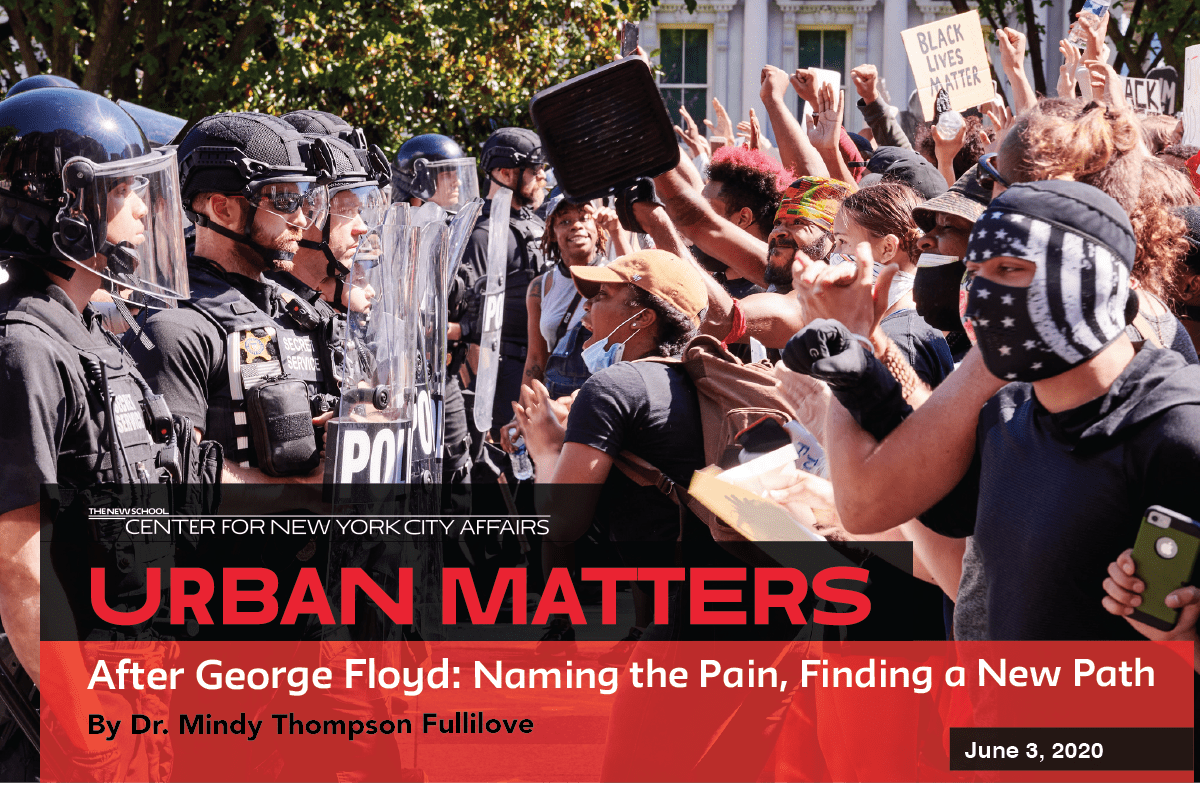
After George Floyd: Naming the Pain, Finding a New Path.

By Dr. Mindy Thompson Fullilove
Herbert Aptheker, the Marxist historian and author of American Negro Slave Revolts, was my professor in college and I often wrote to him in years after graduation to discuss things that were on my mind. One of these was how to name civil unrest. He always used words like “rebellion” to describe the events of the long, hot summers of the 1960s. As my studies of psychiatry progressed, I resisted such language. I thought that “riot” was a better description of the chaotic events that unfolded on the streets, as tempers boiled over and people took their feelings out on storefronts.
Because “riots,” “rioters” and “rioting” are used so disparagingly, there has not been much reason to press the point but it has been rattling around in my brain for a long time. A conversation today with anthropologist Edgar Rivera Colón helped me articulate my thought that those inchoate moments are speaking an emotional language, asking us to listen with our hearts, not our judgments. I think they convey scream, and we are meant to hear and feel all the terror and impossibility held in that scream. I am writing “scream” in italics to make it a neologism, an emotion word. To me, the word “riot” – defined as “public violence, disorder or tumult” – has a core of scream that the word “uprising” does not contain.
As a psychiatrist, that scream is the deep and essential communication and it should neither be denigrated nor prettied up. It is, I realized in the conversation with Edgar, like domestic violence, like the moment when the battered spouse picks up a rolling pin and bashes in the head of the abuser. We are supposed to hear the breaking point in the act, the straw that broke the camel’s back, “no worse there is none, pitched past pitch of grief,” as the poet wrote.
If we could hear the scream, and hear in it the years of torment, we would understand that the battered spouse and the rioter are acting in self-defense. We would honor the courage of their refusal – which I think is what Dr. Aptheker was trying to get at – and we would see from their acts the structural violence that was and is the real danger threatening all of us.
I worked with Hannah Cooper for two years on our book, From Enforcers to Guardians: A Public Health Approach to Ending Police Violence. I read a lot about the kinds of brutality that define policing at its worst. The key analysts of the issue, like Shaun King and Paul Butler, have helped us to see the vast and insidious system of support for this brutality, so extensive that it is nearly impervious to change, and hence the scream.
But we know that this scream at this moment holds much more than the rage at police brutality: the path of the coronavirus has revealed the dense fabric of inequality in a manner we have never seen before, the Grim Reaper striding the paths of social stratification to take the weak, the marginalized, the exposed, while those with wealth and power tweet their derision and deny shelter to the terrified. If this were all going to end in this tenth week of shelter-in-place we might feel some hope, but we see 40 million unemployed, jobs disappearing not to return, and mass evictions and hunger looming on the horizon.
This particular scream has risen from the streets to reach into the hearts of all of us. Maybe 10 weeks ago our ears might have been stoppered with the certainty of the next paycheck, but not now. Now we see, now we hear, now we are so hurt. In this moment we both feel the scream and see the system that is hurting all of us. I find, for myself, that it is only in drawing on spiritual resources that I can do both of these tasks. As Chogyam Trungpa said, “Hold the sadness and pain of samsara in your heart and at the same time the power and vision of the Great Eastern Sun. Then the warrior can make a proper cup of tea.”
Put another way, in the immortal voice of Odetta, “Another man done gone,” a song which is so precise in conveying the pain it has survived decades and crossed cultures, giving us in music an understanding that defies words, yet she holds us to it, helps us face it. In the embracing power of her art, we go deep, which opens time to think.
We need time to absorb these 10 weeks of revelation, to digest that we aren’t going “back to normal,” but to somewhere else, somewhere new. One step forward is to get on the “bus” and go the Poor People’s Assembly on June 20th. RSVP now. You can come on the “bus” of 400 Years of Inequality which will board at 9:30am for the 10am rally. You have to bring your own cake, though we will provide recipes. And you have to make your own signs, though there will be lots of models. You could also organize your own “bus” with your friends and relations. We have to be there, in the space of indignation and planning, so that we can move forward together, in a massive moral fusion coalition, towards a new future that reflects what we are FOR.

Dr. Mindy Thompson Fullilove is a professor of Urban Policy and Health at the Milano School of Policy, Management, and Environment at The New School. This post originally appeared on her blog Countdown to Main Street and in Urban Matters and is republished with her permission.
Banner Photo by Geoff Livingston